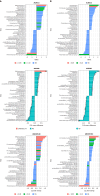Randomized study of Lacticaseibacillus fermented milk in Indonesian elderly houses: Impact on gut microbiota and gut environment
- PMID: 40182598
- PMCID: PMC11962840
- DOI: 10.3748/wjg.v31.i12.104081
Randomized study of Lacticaseibacillus fermented milk in Indonesian elderly houses: Impact on gut microbiota and gut environment
Abstract
Background: Health maintenance in elderly houses includes management of the gut microbiota and the environment. Lacticaseibacillus paracasei Shirota (LcS) is a probiotic strain that positively affects the human gut. However, the evidence of its effects on the Indonesian population remains limited.
Aim: To investigate the effect of LcS-fermented milk on the gut microbiota and environment of Indonesian elderly houses.
Methods: This double-blind, randomized, placebo-controlled trial involved 112 participants from Indonesian elderly houses, spanning a 2-week baseline and 24-week treatment. Participants were randomly assigned to probiotic or placebo groups, consuming fermented milk with or without LcS (> 6.5 × 109 colony-forming units). Fecal samples were collected every three months. Gut microbiota analysis was performed using 16S rRNA gene sequencing and reverse transcription quantitative polymerase chain reaction, while gut environment was assessed by measuring fecal organic acids, amino acid metabolites, and stool frequency.
Results: Analyses of 16S rRNA gene sequence data at the 3-month period revealed increased Bifidobacterium and Succinivibrio and decreased Rikenellaceae RC9 gut group in the probiotic group. These shifts were associated with significant differences in β-diversity metrics. The change in Bifidobacterium was confirmed by reverse transcription quantitative polymerase chain reaction, demonstrating higher abundance in the probiotic group than in the placebo group (8.5 ± 1.1 vs 8.0 ± 1.1, log10 bacterial cells/g; P = 0.044). At 6-month period, the differences in Succinivibrio and Rikenellaceae RC9 gut group persisted. The probiotic group showed higher butyrate levels than the placebo group at the 6-month period (5.04 ± 3.11 vs 3.95 ± 2.89, μmol/g; P = 0.048). The effect on amino acid metabolites and stool frequency was not significant.
Conclusion: Daily intake of LcS positively affects the gut microbiota and environment of people living in Indonesian elderly houses.
Keywords: Elderly; Fermented milk; Intestinal microbiota; Lacticaseibacillus paracasei Shirota; Probiotics.
©The Author(s) 2025. Published by Baishideng Publishing Group Inc. All rights reserved.
Conflict of interest statement
Conflict-of-interest statement: Yamamoto S, Takahashi T, Asahara T, and Akiyama T are affiliated with Yakult Honsha Co., Ltd. The authors declare that the research was conducted in the absence of commercial or financial relationships that could be construed as potential conflicts of interest.
Figures


References
-
- Arifin EN, Ananta A. The Past Three Population Censuses: A Deepening Ageing Population in Indonesia. In: Guilmoto C, Jones G. Contemporary Demographic Transformations in China, India and Indonesia. Cham: Springer, 2016.
Publication types
MeSH terms
Substances
LinkOut - more resources
Full Text Sources

